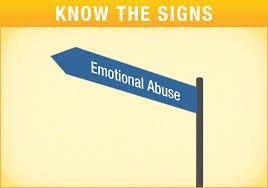“What’s the big deal? It was just emotional abuse.” I can’t tell you how often I’ve heard this sentiment being expressed whether it is directly from a client, a perpetrator, or commentaries made by media forums, the general public, or other social networks that reflect a lack of awareness about the ramifications of emotional abuse. Emotional abuse can be just as devastating as physical or sexual abuse. In fact, because this type of abuse is often quiet and unobtrusive, it is more likely to be overlooked and can be even more damaging if left untreated.
What is Emotional Abuse?
Emotional abuse usually includes mental and verbal abuse and can be accompanied by or separate from physical and sexual abuse. It undercuts an individual’s foundation of self-worth and value. It can occur in different environments such as the family, workplace, or other social venues.
There are different forms of emotional abuse; below are 3, but this is certainly not an all-inclusive list.
- Control and Domination
- Being bullied, humiliated, monitored, manipulated, punished, intimidated, exploited
- Isolation and Alienation
- Refused love and attention, being ignored, abandoned, harshly criticized, belittled
- Terrorizing
- Being interrogated, ridiculed, embarrassed, blamed, threatened, screamed at
How Emotional Abuse Can Affect Human Physiology
There are numerous effects on the heart, mind, and body during abuse. Research has shown that any form of abuse including emotional abuse can negatively alter neurotransmission in the brain and neurotransmitters are essential messengers that control communication throughout the body. The body cannot tolerate being out of homeostasis for long periods of time without becoming ill. The limbic system (which regulates functions including emotion, behavior, and motivation) and the sympathetic nervous system (which is the body’s emergency response system and activates the fight-or-flight response) become overloaded during abuse and can cause detrimental effects on the body. How to
How to Recover from Emotional Abuse
The “good news” is that with support and treatment the body can often restore itself and return to a state of equilibrium. It’s important not to minimize the effects of emotional abuse. However, it is equally important to take steps to empower and strengthen oneself rather than feeding any maladaptive belief systems that may have been reinforced throughout the abuse. For example, a negative belief might be, “I will always be victimized because it’s happened to me so often.”
Getting support and self-empowerment are the keys to recovery. Although perpetrators of abuse are always responsible for their behavior, it is essential that survivors of abuse also understand that they are responsible for their recovery and healing.
There are many paths towards recovery and different methods work for different people but generally, it is important to use an approach that will nourish the heart, mind, and body. Connect to the heart to establish feelings of love, safety, non-judgment, and peace which in turn reduces toxic or obsessive thinking. This can be done through meditation practice, visualization, or relaxation exercise. Help your mind reframe defeating beliefs to more empowering beliefs about yourself and potential and nourish your body with healthy food, regular exercise, and engage in fun social outlets.
You don’t have to do it alone – get support! Specialized Therapy Associates has a wide array of therapeutic services. Please call the intake department at (201) 488-6678 to get more information.


